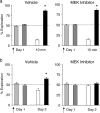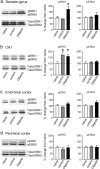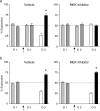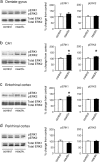Activation of mitogen-activated protein kinase/extracellular signal-regulated kinase in hippocampal circuitry is required for consolidation and reconsolidation of recognition memory
- PMID: 12832561
- PMCID: PMC6741214
- DOI: 10.1523/JNEUROSCI.23-12-05354.2003
Activation of mitogen-activated protein kinase/extracellular signal-regulated kinase in hippocampal circuitry is required for consolidation and reconsolidation of recognition memory
Abstract
Consolidation and reconsolidation of long-term memory have been shown to be dependent on the synthesis of new proteins, but the specific molecular mechanisms underlying these events remain to be elucidated. The mitogen-activated protein kinase (MAPK) pathway can trigger genomic responses in neurons, leading to changes in protein synthesis, and several studies have identified its pivotal role in synaptic plasticity and long-term memory formation. In this study, we analyze the involvement of this pathway in the consolidation and reconsolidation of long-term recognition memory, using an object recognition task. We show that inhibition of the MAPK pathway by intracerebroventricular injection of the MEK [MAPK/extracellular signal-regulated kinase (ERK)] inhibitor UO126 blocks consolidation of object recognition memory but does not affect short-term memory. Brain regions of the entorhinal cortex-hippocampal circuitry were analyzed for ERK activation, and it was shown that consolidation of recognition memory was associated with increased phosphorylation of ERK in the dentate gyrus and entorhinal cortex, although total expression of ERK was unchanged. We also report that inhibition of the MAPK pathway blocks reconsolidation of recognition memory, and this was shown to be dependent on reactivation of the memory trace by brief reexposure to the objects. In addition, reconsolidation of memory was associated with an increase in the phosphorylation of ERK in entorhinal cortex and CA1. In summary, our data show that the MAPK kinase pathway is required for both consolidation and reconsolidation of long-term recognition memory, and that this is associated with hyperphosphorylation of ERK in different subregions of the entorhinal cortex-hippocampal circuitry.
Figures




Similar articles
-
Differential BDNF signaling in dentate gyrus and perirhinal cortex during consolidation of recognition memory in the rat.Hippocampus. 2012 Nov;22(11):2127-35. doi: 10.1002/hipo.22033. Epub 2012 May 10. Hippocampus. 2012. PMID: 22573708
-
Activation of extracellular signal-regulated kinase- mitogen-activated protein kinase cascade in the amygdala is required for memory reconsolidation of auditory fear conditioning.Eur J Neurosci. 2005 Jan;21(1):283-9. doi: 10.1111/j.1460-9568.2004.03824.x. Eur J Neurosci. 2005. PMID: 15654867
-
PKC-epsilon activation is required for recognition memory in the rat.Behav Brain Res. 2013 Sep 15;253:280-9. doi: 10.1016/j.bbr.2013.07.036. Epub 2013 Jul 30. Behav Brain Res. 2013. PMID: 23911427
-
The MAP(K) of fear: from memory consolidation to memory extinction.Brain Res Bull. 2014 Jun;105:8-16. doi: 10.1016/j.brainresbull.2013.09.007. Epub 2013 Sep 27. Brain Res Bull. 2014. PMID: 24080449 Review.
-
MAPK, CREB and zif268 are all required for the consolidation of recognition memory.Philos Trans R Soc Lond B Biol Sci. 2003 Apr 29;358(1432):805-14. doi: 10.1098/rstb.2002.1224. Philos Trans R Soc Lond B Biol Sci. 2003. PMID: 12740127 Free PMC article. Review.
Cited by
-
Estradiol-induced object recognition memory consolidation is dependent on activation of mTOR signaling in the dorsal hippocampus.Learn Mem. 2013 Feb 19;20(3):147-55. doi: 10.1101/lm.026732.112. Learn Mem. 2013. PMID: 23422279 Free PMC article.
-
Early growth response-1 induction by fibroblast growth factor-1 via increase of mitogen-activated protein kinase and inhibition of protein kinase B in hippocampal neurons.Br J Pharmacol. 2010 Aug;160(7):1621-30. doi: 10.1111/j.1476-5381.2010.00812.x. Br J Pharmacol. 2010. PMID: 20649566 Free PMC article.
-
PKG-mediated MAPK signaling is necessary for long-term operant memory in Aplysia.Learn Mem. 2011 Jan 18;18(2):108-17. doi: 10.1101/lm.2063611. Print 2011 Feb. Learn Mem. 2011. PMID: 21245212 Free PMC article.
-
Profiling the MAPK/ERK dependent and independent activity regulated transcriptional programs in the murine hippocampus in vivo.Sci Rep. 2017 Mar 28;7:45101. doi: 10.1038/srep45101. Sci Rep. 2017. PMID: 28349920 Free PMC article.
-
Animal Models of Metabolic Disorders in the Study of Neurodegenerative Diseases: An Overview.Front Neurosci. 2021 Jan 18;14:604150. doi: 10.3389/fnins.2020.604150. eCollection 2020. Front Neurosci. 2021. PMID: 33536868 Free PMC article. Review.
References
-
- Abel T, Lattal KM ( 2001) Molecular mechanisms of memory acquisition, consolidation and retrieval. Curr Opin Neurobiol 11: 180–187. - PubMed
-
- Atkins CM, Selcher JC, Petraitis JJ, Trzaskos JM, Sweatt JD ( 1998) The MAPK cascade is required for mammalian associative learning. Nat Neurosci 1: 602–609. - PubMed
-
- Bradford M ( 1976) A rapid and sensitive method for the quantitation of microgram quantities of protein utilising the principle of protein dye binding. Anal Biochem 72: 248–254. - PubMed
Publication types
MeSH terms
Substances
LinkOut - more resources
Full Text Sources
Medical
Miscellaneous
